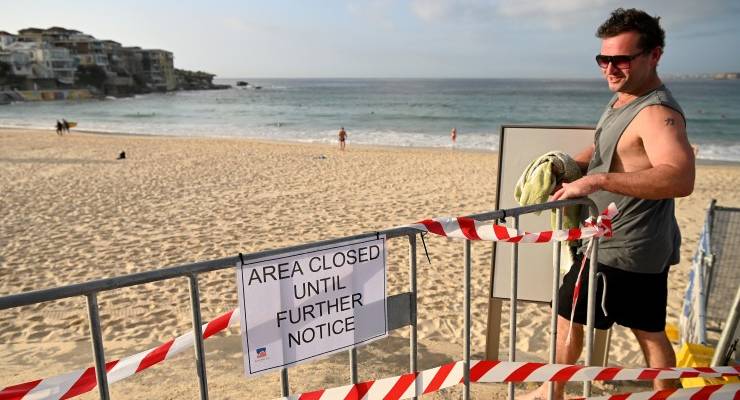
To the fury of politicians and commentators, large numbers of Australians clearly aren’t interested in social distancing. They’re still flocking to beaches and congregating in bars and insisting on maintaining their normal, sociable lives.
Beaches and bars have now been shut down, amid scolding of those not taking the threat of the virus seriously enough.
Some blame mixed messaging. It’s barely a week since the prime minister declared he was going to the footy and encouraging Australians to go about their lives, to go on being Australian, while the chief medical officer was happily shaking hands.
But the messages were only mixed for those actually paying attention. Those engaged in public life, and those of us who pay close attention to them, regularly forget how little attention vast swathes of the population pay to politics and news media.
Messages about density, distance and other subtleties of minimising the risk of infection are likely not registering with large numbers of Australians, let alone shifting behaviour. Especially when the NRL insists on blithely continuing its season.
The failure has prompted much more draconian restrictions from governments, which public health experts have been demanding for some time. Command and control is embedded deep in the mindset of population-health academics, who see the public as a mass of bad habits and poor decision-making in need of constant correction via compulsion or incentive by those who know better.
The behaviour of large numbers of people in ignoring social distancing will inspire countless theses and academic papers in the years ahead, all centring on the theme of the need for greater social marketing and control.
A point that’s been forgotten in the headlong rush into crisis over the last ten days, but which a lot of us were talking about prior to that, is the issue of trust in governments, which was at historic lows prior to the crisis.
Many of us fretted, and still fret, that that lack of trust would corrode the beneficial effects of the government’s stimulus packages. Less examined was the possibility that it might also undermine compliance with public health measures.
Not through active mistrust in what officials, elected and otherwise, were saying about the virus, or in conspiracy theories, although there’s been plenty of those, but through general disengagement with anything coming out of the political system.
That system, after all, is seen by the majority of voters as being run by self-interested politicians for a few big interests, rather than for the benefit of all Australians. That is, it’s not a system that is particularly relevant to many voters.
So when politicians — and the rest of us in Australia’s governing class, which includes the media, academia and business leaders — scold Australians for their public health recalcitrance, we’re harvesting a crop we ourselves have sown over the last decade and a bit, since 2007 when levels of trust in government and politicians were at all-time highs.
Leaders can’t alienate large numbers of voters with their self-interested behaviour and then expect automatic engagement and compliance when things go JG Ballard on us.
The contrast with the bushfire crisis — which now seems a distant memory from a kinder, gentler world — is significant and noteworthy. That was much less about compliance with directives, but the instinctive response of so many Australians was to give generously to those who’d suffered.
That is, Australians respond with generosity to their own community and to fellow Australians.
The mistake our leaders have made has been to fail to emphasise that exactly the same generosity of spirit is now required; that Australians must sacrifice again to help protect those who are most vulnerable, among their own families, neighbours and community.
Anything else requires the building-up of trust, something hard to win and easily lost. And our leaders have spent years squandering it.








Crikey is committed to hosting lively discussions. Help us keep the conversation useful, interesting and welcoming. We aim to publish comments quickly in the interest of promoting robust conversation, but we’re a small team and we deploy filters to protect against legal risk. Occasionally your comment may be held up while we review, but we’re working as fast as we can to keep the conversation rolling.
The Crikey comment section is members-only content. Please subscribe to leave a comment.
The Crikey comment section is members-only content. Please login to leave a comment.